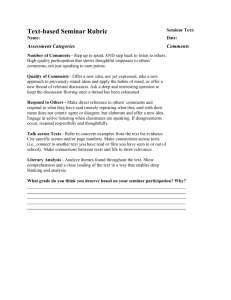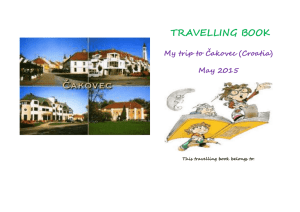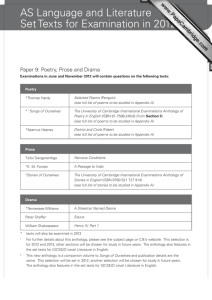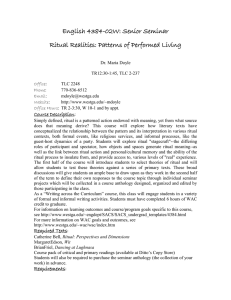New Literatures in English: Travel Writing
advertisement
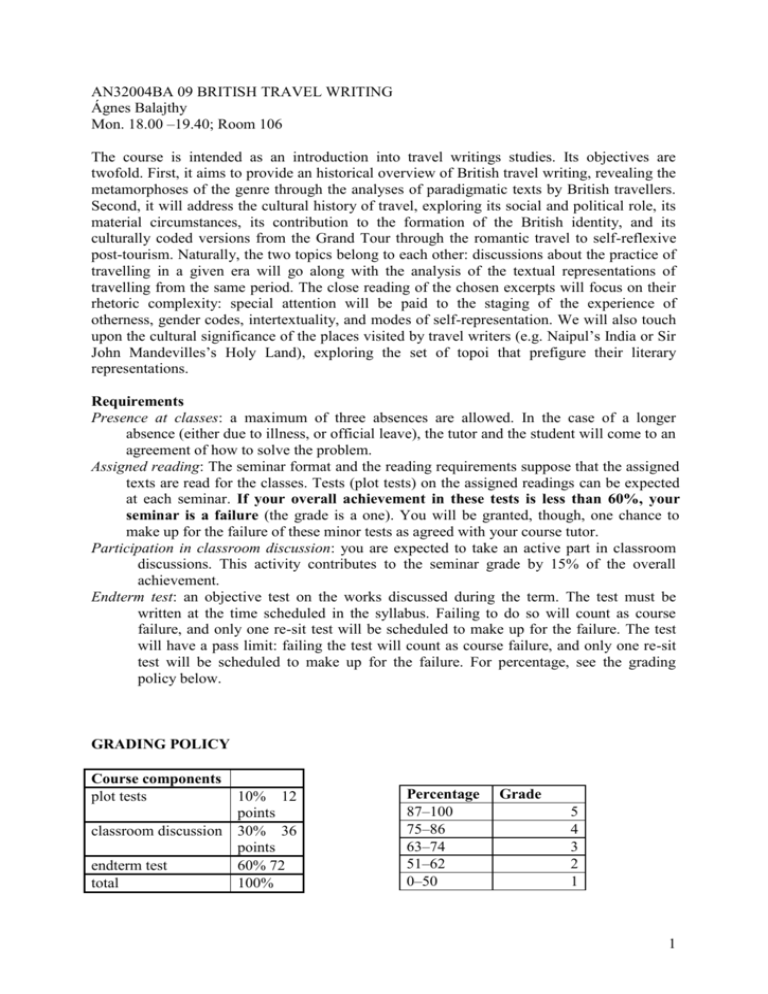
AN32004BA 09 BRITISH TRAVEL WRITING Ágnes Balajthy Mon. 18.00 –19.40; Room 106 The course is intended as an introduction into travel writings studies. Its objectives are twofold. First, it aims to provide an historical overview of British travel writing, revealing the metamorphoses of the genre through the analyses of paradigmatic texts by British travellers. Second, it will address the cultural history of travel, exploring its social and political role, its material circumstances, its contribution to the formation of the British identity, and its culturally coded versions from the Grand Tour through the romantic travel to self-reflexive post-tourism. Naturally, the two topics belong to each other: discussions about the practice of travelling in a given era will go along with the analysis of the textual representations of travelling from the same period. The close reading of the chosen excerpts will focus on their rhetoric complexity: special attention will be paid to the staging of the experience of otherness, gender codes, intertextuality, and modes of self-representation. We will also touch upon the cultural significance of the places visited by travel writers (e.g. Naipul’s India or Sir John Mandevilles’s Holy Land), exploring the set of topoi that prefigure their literary representations. Requirements Presence at classes: a maximum of three absences are allowed. In the case of a longer absence (either due to illness, or official leave), the tutor and the student will come to an agreement of how to solve the problem. Assigned reading: The seminar format and the reading requirements suppose that the assigned texts are read for the classes. Tests (plot tests) on the assigned readings can be expected at each seminar. If your overall achievement in these tests is less than 60%, your seminar is a failure (the grade is a one). You will be granted, though, one chance to make up for the failure of these minor tests as agreed with your course tutor. Participation in classroom discussion: you are expected to take an active part in classroom discussions. This activity contributes to the seminar grade by 15% of the overall achievement. Endterm test: an objective test on the works discussed during the term. The test must be written at the time scheduled in the syllabus. Failing to do so will count as course failure, and only one re-sit test will be scheduled to make up for the failure. The test will have a pass limit: failing the test will count as course failure, and only one re-sit test will be scheduled to make up for the failure. For percentage, see the grading policy below. GRADING POLICY Course components plot tests 10% 12 points classroom discussion 30% 36 points endterm test 60% 72 total 100% Percentage 87–100 75–86 63–74 51–62 0–50 Grade 5 4 3 2 1 1 Texts: Assigned readings: Twelve copies of Sterne’s A Sentimental Journey are available in the library, the other texts will be deposited in a course packet in the Institute Library (rm. 101). Week Date Topic 1 15/02 Introduction: the origins of travel writing 2 22/02 Medieval pilgrimages The Travels of Sir John Mandeville, Chapter XXI 3 29/02 Travel writing in the age of geographical discoveries William Dampier: A New Voyage Round the World. [excerpt] In: Travel Writing 1700–1830: An Anthology, Bohls, Elizabeth A. and Ian Duncan. Oxford: OUP, 2005. 68 – 77, 426-429. Lady Mary Wortley Montagu: ‘Embassy Letters’. [excerpt] In: Travel Writing 1700–1830: An Anthology, 68 – 77. 4 5 6 7 8 9 10 11 12 07/03 The Grand Tour and ‘the sentimental journey’ Joseph Addison: Remarks on Several Parts of Italy, in: Travel Writing 1700–1830: An Anthology, 5-10. 14/03 The romantic journey and the emergence of tourism Mary Shelley: Rambles in Germany and Italy, Volume 1., Letter III, VII, VIII. (31 – 41, 73-94.) 21/03 The ‘golden age of travel’ – travel writing and high modernism Robert Byron: Road to Oxiana, 277-298, 332-333 Paul Fussell: Abroad, 73-79 D. H. Lawrence: Sea and Sardinia, 55-69 28/03 Consultation week, no class 04/04 (Post)colonial travelling – V. S. Naipaul’s India V. S. Naipul, An Area of Darkness, 1-60, 186 – 196 11/04 Anti-travel writing Claude Levi-Strauss: Tristes Tropique, 17-18, 323-341, Jamaica Kincaid: A Small Place, 1-19. 18/04 England from inside and outside – Jonathan Raban’s Coasting Coasting, 9-28, 52-102 25/04 Ethnography and the postmodern travel narrative – Bruce Chatwin’s The Songlines The Songlines, 1-73, 156 – 196 02/05 End-term test Evaluation in my office hours by appointment from 9 May on. 2
